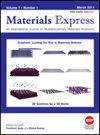LSD1 inhibitor hinders the demethylation of FOXA1 to inhibit prostate cancer progression
IF 0.7
4区 材料科学
Q3 Materials Science
引用次数: 0
Abstract
Abnormal activation of androgen receptor (AR) occurs in prostate cancer (PC) progression and metastasis. Lysine-specific demethylase 1 (LSD1), the first demethylating enzyme, regulates AR-mediated transcriptional activity. Considering the effect of Forkhead box protein A1 (FOXA1) on the expression of AR, estrogen receptor (ER) and tumor suppressor genes, this study investigated the demethylation of FOXA1 upon treatment with LSD1 inhibitors and assessed the biological behaviors of PC cells. PC cells were cultured and infected with viruses. After transient transfection, CWR22-RV1-Cas9 cells were selected by puromycin with expression of LSD1 detected by Western blot. Apart from measurement of formaldehyde production, immunoprecipitation and chromatin immunoprecipitation (ChIP) were performed, followed by ATAC-seq detection, and Western blot. The data indicated the association between LSD1-binding sites and high levels of FOXA1. LSD1 inhibitor treatment resulted in a dramatic decline in overall FOXA1 binding, significantly reducing chromosomal accessibility and also increasing lysine-methylated FOXA1 level, but it failed to affect H3K4me2 levels at LSD1-FOXA1 occupied sites. Overexpression of LSD1-WT obtained reverse outcome. Besides, LSD1 inhibition diminished binding of FOXA1 and restored lysine-methylation of FOXA1 in methylation-deficient cells with mutant K270R. Moreover, silencing of LSD1 suppressed CWR22-RV1 tumor growth, resulting in increased H3K4me2 and decreased AR-FL/V7 gene expression. K270me is demethylated by LSD1. LSD1 inhibitor disrupts FOXA1 chromatin association, blocks FOXA1 K270-demethylation and hinders AR binding, thereby suppressing PC cell growth.LSD1 抑制剂阻碍 FOXA1 的去甲基化,从而抑制前列腺癌的进展
雄激素受体(AR)的异常激活在前列腺癌(PC)的进展和转移中发生。赖氨酸特异性去甲基酶1 (LSD1)是第一个去甲基化酶,调节ar介导的转录活性。考虑叉头盒蛋白A1 (FOXA1)对AR、雌激素受体(ER)和肿瘤抑制基因表达的影响,本研究研究了LSD1抑制剂对PC细胞FOXA1去甲基化的影响,并评估了PC细胞的生物学行为。培养PC细胞并对其进行病毒感染。短暂转染后,用嘌呤霉素筛选CWR22-RV1-Cas9细胞,Western blot检测LSD1的表达。除测定甲醛产量外,还进行免疫沉淀和染色质免疫沉淀(ChIP),随后进行ATAC-seq检测和Western blot。这些数据表明lsd1结合位点与高水平的FOXA1之间存在关联。LSD1抑制剂治疗导致FOXA1总体结合显著下降,显著降低染色体可及性,并增加赖氨酸甲基化FOXA1水平,但未能影响LSD1-FOXA1占据位点的H3K4me2水平。过表达LSD1-WT获得相反的结果。此外,LSD1抑制减少了FOXA1的结合,恢复了突变体K270R的甲基化缺陷细胞中FOXA1的赖氨酸甲基化。此外,LSD1的沉默抑制了CWR22-RV1的肿瘤生长,导致H3K4me2升高,AR-FL/V7基因表达降低。K270me被LSD1去甲基化。LSD1抑制剂破坏FOXA1染色质关联,阻断FOXA1 k270 -去甲基化,阻碍AR结合,从而抑制PC细胞生长。
本文章由计算机程序翻译,如有差异,请以英文原文为准。
求助全文
约1分钟内获得全文
求助全文
来源期刊

Materials Express
NANOSCIENCE & NANOTECHNOLOGY-MATERIALS SCIENCE, MULTIDISCIPLINARY
自引率
0.00%
发文量
69
审稿时长
>12 weeks
期刊介绍:
Information not localized
 求助内容:
求助内容: 应助结果提醒方式:
应助结果提醒方式:


